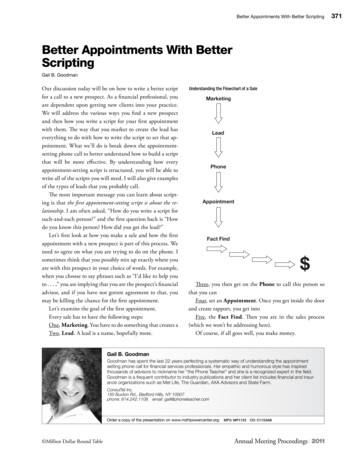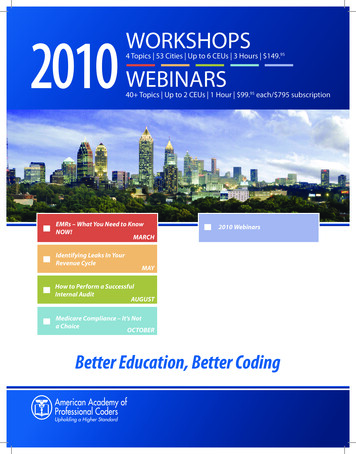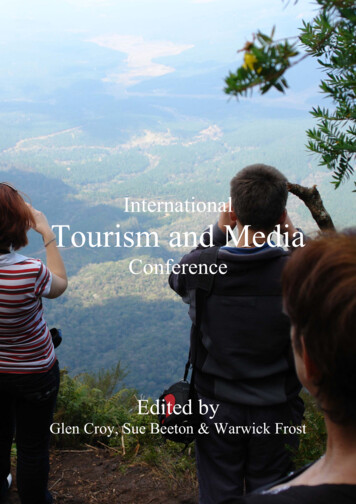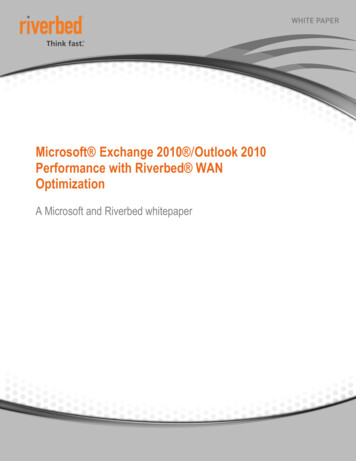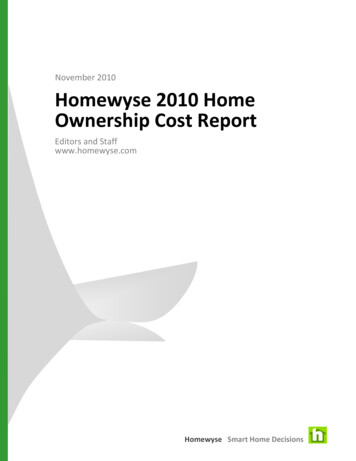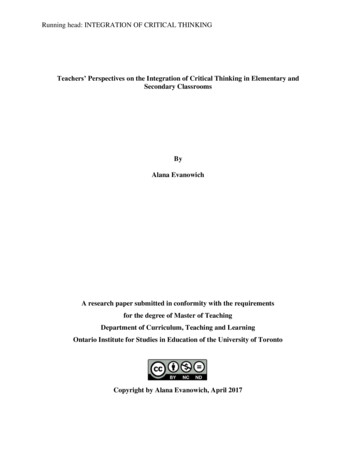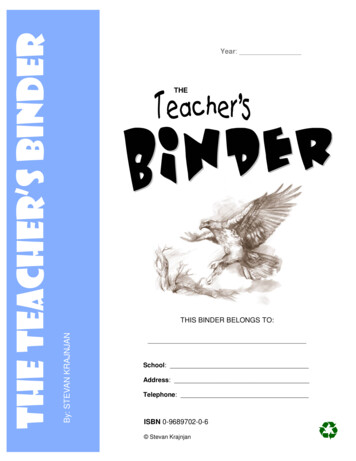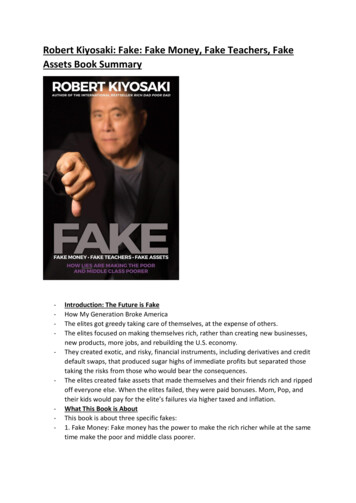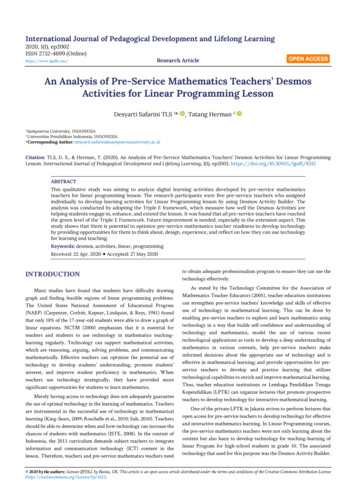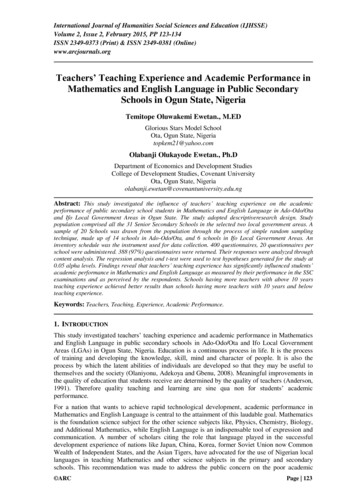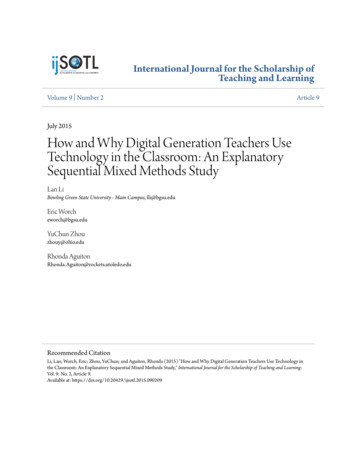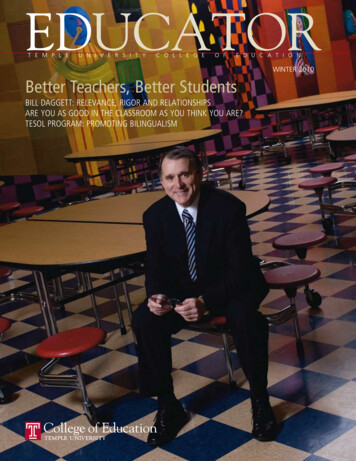
Transcription
EDUCATORT E M P L EU N I V E R S I T YC O L L E G EO FE D U C A T I O NWINTER 2010Better Teachers, Better Studentsbill daggett: relevance, rigor and relationshipsare you as good in the classroom as you think you are?tesol program: promoting bilingualism
COLLEGE OF EDUCATIONCOMMENCEMENT AWARD CEREMONYCOLLEGE OF EDUCATION SCHOLARSHIP AWARDRECIPIENTS 2009–2010STUDENT TEACHEROF THE YEAR AWARDMelanie WillsTheresa FrederickSANDRA M. WILLIAMSMEMORIAL FUNDKENNETH BRENNENSCHOLARSHIP FUNDAbegael WeaverTEACHER EDUCATIONGRADUATE IN ELEMENTARYEDUCATION/EARLY CHILDHOODMichelina A. HobbieTEACHER EDUCATIONGRADUATE INSECONDARY EDUCATIONJohn C. EatonTEACHER EDUCATIONGRADUATE IN CAREER ANDTECHNICAL EDUCATIONStephanie WalshSUBARNA BANERJEEEXCELLENCE AWARDEunhee SeoBENJAMIN BANNEKER AWARDAnthony PerezTEACHER EDUCATIONGRADUATEIN SPECIAL EDUCATIONDawn DzierwinskiSUSAN R. LEVENTHALMEMORIAL AWARDRachel DiGregorioElizabeth WattoL. WALDO RICH AWARD,THE DR. ELTON ROBERTSONAWARD IN TECHNOLOGYSARA RHUE MEMORIAL FUNDJANE ADAMS SCHOLARSHIPColeena CichockiRoss MarkmanLaura A. LamonDaniel J. DiRenzoHeather SoltroffSonia EugeneJennifer TabassumKristen HawkinsElizabeth TorressonShawn TemplinKathryn R. CrumpMeghan RagniRachel LevinMargaret R. RobbinsAmanda L. ClarkRae T. RudzinkiCourtney McMeansPriscilla I. GoodenAshley D. SamuelTEMPLE UNIVERSITY CHAPTERPHI DELTA KAPPAMARTHA MOYER EBBERT,CLASS OF 1937 SCHOLARSHIPDerek SederMarquita WilliamsOumar N’DiayeDEAN WILLARD ZAHNTRIBUTE AWARDLois Sheena JohnsonAleksandra ChechlaSENIOR PERFORMANCEASSESSMENT WITHDISTINCTIONGretchen BartholomewShannon BronicoPaul CamachoAleksandra ChechlaElyssa A. GlezermanStephanie KarmokoliasNashely C. SilvaAbegael WeaverAdrienne M. WollSTUDENT AMBASSADORAWARDStephen DiDatoMaxfield DorseyTammy M. ExnerTara GrantKatie GrayBeverly HendersonSusan LeeJennifer MannAndrea TerreroKevin PattersonMelanie StulbSusan LeeDR. JOHN G. FINCH AWARDIN TECHNOLOGYJon WelshfordBENJAMIN VERDILE ALUMNISERVICE AWARDMaxfield DorseyDR. RITA WOLOTKIEWICZAWARD FUNDJemry SmallROY B. HACKMANSCHOLARSHIP FUNDSteven LuckeyDR. DICK MALNATI AWARDEanah BrownZoe FreemanWe greatly appreciate the generosity of the alumni, faculty, staffand friends who have established and contribute to the College ofEducation’s Commencement Awards.DALIBOR W. KRALOVECSCHOLARSHIPFLYNN ENDOWMENT FUNDDR. ALFRED AND SHIRLEYFREEMAN SCHOLARSHIPSusan KronmillerKhamari A. YoungBERNARD AND MARIEGRANOR SCHOLARSHIPJill T. ElwellEMMA JOHNSON SCHOLARSHIPMarian MenowDILYS MARTHA AND MARTHAANN JONES SCHOLARSHIP FUNDTaj K. ByrdDR. MILDRED RICE JORDANSCHOLARSHIPDeAnna J. WatsonMARGARET J. MESSINGERSCHOLARSHIP FUNDBrian ChambersNatalie Ramos-CastilloSCHLIMM FAMILY SCHOLARSHIPCourtney S. WorthCONRAD SEEGER MEMORIALAWARDTaj K. ByrdJUDITH BERNSTEIN SCHOLARSHIPAdhijit B. DesaiGENERAL COLLEGE OFEDUCATION SCHOLARSHIPBridget SweeneyMeredith C. ClassenTraci DoughertyCara MooreAlicia McCoy MahoneyBarry NathanDennis BeckMollie BookCiara K. FrankKaitlin WilsonMelissa LenoxXuejiao LinNikole VernamontiLois Sheena JohnsonDesiree Y. LaMarrErik GriffithAlicia McCoy MahoneyMarilyn CalderonEileen WaltersAmanda HelriegelMatthew DurkinBridget A. FranceMARLENE SMIGEL KORNHUMANITARIAN AWARDSandra Brockington GouldMARGARET WANGSCHOLARSHIP FUNDJacqueline PalmerAnnie HuynhNosheen H. MughalJulianne SpittalAlejandro A. UlloaHAZEL RANIERI AWARD FUNDNicole VernamontiRUTH TOWNE MEMORIAL FUNDLauren SchootROBERT J. SMITHMEMORIAL SCHOLARSHIPBrittany JacobsBriana McCoyChonte C. HuntSTANLEY ROSNER AWARD FUNDJeri Baucum McKinneyRebecca J. ThompsonIRWIN HYMAN AWARD FUNDBridget SweeneySPECIAL MENTIONMARSHALL SCHOLARSHIPChristina ThatcherFULBRIGHT SCHOLARSHIPDiana DenegaAll College of Education scholarships and awards are made possible throughthe generous support of our alumni, friends, parents, faculty and staff.
EDUCATORT E M P L EU N I V E R S I T YC O L L E G EO FE D U C A T I O NFALL 2009Better Teachers, Better Studentsbill daggett: relevance, rigor and relationshipsare you as good in the classroom as you think you are?tesol program: promoting bilingualismF E A T U R E SEditorValerie V. Gay, CFPContributing WritersBruce E. BeansValerie Gay2Dean’s Message4Relevance, Rigor and Relationships10Are You as Good in the Classroomas You Think You Are?16TESOL PROGRAM:Promoting Bilingualism in anEnglish-speaking World22Dr. Bill Cosby’s Fireside ChatsDesignTemple UniversityCreative Services296-0809PhotographersJoseph V. LabolitoJacques-Jean TiziouDavid DeBalkoRyan BrandenbergDavid MatthewsValerie V. Gay· · ·D E P A R T M E N T STemple UniversityCollege of EducationDeanC. Kent McGuire, PhD24Our Students Speak26Message from the Editor27News in Briefasistant deAN, INSTITUTIONAL ADVANCEMENT33New FacultyASSISTANT DIRECTOR OF ALUMNI AFFAIRS36Faculty Notes37Faculty Profile41Alumni Notes44In MemoriamAssociate DeanJames P. Byrnes, PhDCHAIR, COLLEGIAL ASSEMBLYS. Kenneth Thurman, PhDDirector of Administrative ServicesJohn FrancesconeDirector of student servicesPatricia Louison, EdDValerie V. Gay, CFPTiffany TavarezPresident, College of EducationAlumni AssociationGaylord J. Conquest, EdDCorrespondence:Temple UniversityCollege of EducationOffice of Institutional AdvancementRitter Annex 2231301 Cecil B. Moore AvenuePhiladelphia, PA 19122-6091
dean’s messageSince my arrival just about six years ago,the College of Education has mademajor improvements in several keyareas. With considerable investment innew technologies, we have significantlyenhanced the college’s infrastructure,with smart classrooms, new science labsand a new student center all enhancingour efficiency.As we’ve outlined in previous editionsof Educator, to increase capacity we’vealso made significant investments inrecruiting new, distinguished facultyand staff. Having achieved both greaterefficiency and capacity, the college’smain focus has turned to creating newprogramming that produces even betterteachers and better educations for thisnation’s school children.New Programs to Meet NewEducational ChallengesEducatorl2lFall 2009We highlighted two such programs inthe last issue: TUteach, which recruitsscience and math students to obtainsecondary teaching certificates alongwith their BS degrees, and E mc2, whichtrains mid-career and early-retiree mathand science professionals to becomemiddle school teachers in high-needschools. This issue features another
example: our Center for TeachingExcellence, which is just one of fouruniversity-based programs statewidededicated to producing masterteachers who qualify for the prestigiousNational Board of Professional TeachingStandards’ certification. Improvingour children’s education is the goalof Willard Daggett, EdD ’74, one ofour impressive graduates profiled inthis issue.to increase attention to field experienceand the education of diverse learners.These revisions will reflect both stateimposed higher content standards andour own efforts to make sure that theofferings are sensitive to and supportthe needs of diverse learners.Currently we are undergoing a completerethinking of our undergraduate teachereducation offerings. We’re doing sopartly in response to changing statestandards. But this restructuring alsois the result of changes in our viewsabout what will be needed over thenext decade or so for teachers to meetthe needs and demands of Americaneducation.In addition — and this might be ofparticular interest to alumni — we aredeveloping programs customized tothe needs and time constraints ofworking professionals. This fall we willbe offering certification, master’s anddoctoral programs that will combinea greater use of online offerings withweekend and summer sessions. In otherwords, the programs will be theeducational equivalent of an executiveMBA format. Please check our web siteat www.temple.edu/education to receivethe most up-to-date information.This substantial revision will result in acompletely new program in earlychildhood education through grade 4,as well as new offerings in grades 4through 8, beginning in the fall of 2010.Changes are also being made to oursecondary education programs (9–12)Finally, we salute the accomplishmentsof our students, staff and faculty fortheir outstanding work this past year.Please take a moment to look at the listof student award recipients, who morethan deserve the accolades they havereceived. We would also like toacknowledge the following faculty andstaff for their achievements:Dr. Patricia J. LouisonUndergraduate Academic AdvisingAward 2009Dr. Frank H. FarleyAERA Fellow 2008Dr. Glenn E. SnelbeckerAERA Fellow 2008Dr. Christine A. WoyshnerGreat Teacher Award 2008–2009We are also proud to report that wehad more than 30 faculty and studentparticipants in the 2009 AmericanEducational Research Associationannual conference.As you can see, the College of Educationis moving forward with exciting thingsto come, and we again thank you for allof your continued support!C. Kent McGuire, PhDDeanEducatorl3lFall 2009
Relevance, Rigorand Relationships:Bill Daggett’s Three R’s for American SchoolsWillard “Bill” R. Daggett, EdD ’74, is telling several hundred principals fromthe School District of Philadelphia about Jack, his 6-year-old grandson inNorth Carolina who recruited his grandfather to play touch football.In the huddle, the school improvement consultant couldn’t believe whathe was hearing. “Go out 20 feet and cut 25 degrees to the left,” Jack, histeam’s quarterback, instructed one of his friends. Daggett realized his grandson had made a slight mistake — he should have told his friend to cut 90degrees — but he was stunned that these first-graders were using percentiles:a sixth- or seventh-grade math concept.“Where’d you learn that?” Daggett asked afterward. “From our first-gradeteacher,” Jack replied. Intrigued, Daggett met Jack’s teacher, who told himthat — after learning Jack and his friends loved football — she invited thelocal high school football coach to teach her students pass plays.Educatorl4lFall 2009
“ For students, we needed to be able to answer a reallysimple question: ‘Where will I ever use what I’m being taught today?’”A prime example, Daggett tells the principals, of his academic Rigor/RelevanceFramework that has become a cornerstone of many school reform effortsthroughout the country. And then thereis the fact that Jack’s teacher knewenough about the boys’ interests thatshe realized a visit from a football coachwould engage and focus their minds.“Until you have a relationship with kidsyou can’t tell what’s relevant for them,and it is relevance that makes rigorpossible,” says Daggett, winner of oneof the College of Education’s prestigiousGallery of Success Awards in 2007.Daggett has given a similar talk hundredsof times to educators and educationstakeholders in all 50 states and abroadsince founding the International Centerfor Leadership in Education in 1991 inRexford, N.Y., near Albany. He hasassisted and consulted in all 50 states andhundreds of school districts regardingtheir school improvement initiatives— many in response to the No ChildLeft Behind Act and its adequate yearlyprogress (AYP) provisions.He currently has a staff of 38 full-timeemployees (half of whom consult) andmore than a 100 independent contractors, teachers and educational administrators throughout the country who actas additional consultants in spreadingDaggett’s school improvement gospel.Reaching across all demographics, hisfirm has worked with Louisiana’s 34lowest performing high schools and theEducatorl6lFall 2009worst performing high schools in LosAngeles, as well as affluent schools fromGeorgia to Hawaii.“I love what I do,” says Daggett. “We seeschools that are so dramatically outperforming where they were five or 10 yearsago. Brockton High School in Brockton,Mass., has more than 4,000 students,more than 70 percent of whom areminorities. After working with themfor three years they’ve become one ofthe highest performing high schoolsin the state.“Everybody said it couldn’t be done,but it can be. Why? Because the kids areexcited about school.”Daggett also has collaborated with theNational Governors Association andadvised educational systems in Canada,Argentina, Great Britain, Germany,Hungary, Russia, Japan and Saudi Arabia.The Successful Practices Network, a related nonprofit established by Daggett andhis wife, Bonnie, received a grant fromthe Bill and Melinda Gates Foundationto enable 600 schools to share their bestpractices. The Gates Foundation is alsofunding a five-year effort in collaborationwith the Council of Chief State SchoolOfficers to identify 75 of the highest performing high schools and analyze the bestpractices they are employing that wouldbe most effective in the 600 SuccessfulPractice Network schools.Says Raymond J. McNulty, Daggett’ssenior vice president who formerly wasboth a senior fellow with the GatesFoundation and Vermont’s educationcommissioner: “To improve public education, many funders such as the GatesFoundation are looking for great, replicable models of schools that appear to bebeating the odds. For example, schoolswhose students are 90 percent minoritieswho are achieving at the 90th percentile.“For years Bill has been finding thesegreat schools and sharing his findingswith others.”Now in its 17th year, the InternationalCenter’s annual four-day Model SchoolsConference draws more than 6,000 educators, and an annual three-day symposiumfor school districts draws 2,000 more.“We do no advertising and we have nonatural constituency like national principals associations, yet we outdraw mostmajor conferences in the country,”says Daggett. “People are voting withtheir feet because they love to see thesesuccessful schools.”Daggett developed his Rigor/RelevanceFramework over more than two decadesduring an educational career that includedbrief stints as both a high school businessteacher and soccer coach and as an assistant professor at two different colleges.While earning his doctorate at Temple,he spent a year each as a teaching associate at Temple and Russell Sage Collegein Troy, N.Y.
He was attracted to Temple’s doctoralprogram because of its emphasis on vocational education — not in the traditionalsense of educating students for tradessuch as carpentry or plumbing but bybringing theory to practice in order toeducate students for mid- and seniorlevel jobs. “It was a junior version ofHarvard’s MBA program,” says Daggett,“a case study approach.”At Temple the seeds of his rigor andrelevance concept were first planted.“In most universities you have silos, onecalled academic education and the othercalled professional schools, and theyusually never may they meet,” he says.“But the Temple program really integrated a lot of academics and case-studyapproaches to business.”Daggett was particularly influenced bytwo professors, William Sassaman, EdD(deceased), who chaired his doctoralcommittee, and Marvin Hershfeld, thechairman of the Vocational TechnicalDepartment and Distributive Education.“Marv was great on practice and Bill wasreally good at theory,” recalls Daggett.“Trying to meet both of their needs whiledefending my dissertation forced me tothink deeper and harder about howto bring practice and theory together.”After earning his doctorate in 1974,Daggett became an associate in businesseducation for the New York StateEducation Department — the first offour state posts that over the next 17years would include chief of the Bureauof Business Education, chief of the Bureauof Occupational Education Departmentand finally director of the Division ofOccupational Education Instruction.His initial task: “For students, we neededto be able to answer a really simple question: ‘Where will I ever use what I’mbeing taught today?’ It sounds crazy,but a lot of teachers can’t answer thatquestion, other than saying you can useit on the test, which is not what thestudents are asking us. They’re really asking, ‘How does this relate to the worldbeyond school?’”One conundrum facing the state: only 43percent of high school seniors were passing the rigorous N.Y. State RegentsExam, a voluntary test that qualified thestudents for reduced tuition at any stateuniversity. About a quarter of theremaining 57 percent took the exam andfailed, but Daggett says about 40 percentnever even tried. State educators weredebating whether all students should beforced to complete the kind of rigorousacademic program that would enablethem to pass the test, or should they begiven what Daggett calls a “watereddown program and call it vocational oroccupational education?”He believed focusing on just academicrigor for the 43 percent high achievers andon just job skills for the other 57 percentwere both doomed approaches. Instead,give both types of students rigorous,relevant education, and most will becomelife-long learners with the critical skillsEducatorl7lFall 2009
“Everybody said it couldn’t be done, but it can be. Why?Because the kids are excited about school”necessary to forge a career, not just betrained for a job that technology couldrapidly transform.help teachers answer that basic questionfrom students: ‘Where will I ever use whatyou’re teaching me today?’”The debate hit close to home for Daggett,who graduated 39th in his high schoolclass of 43 seniors and never tried to earna Regents diploma. “I never attemptedit because I didn’t think school wasreally relevant,” he recalls. “All I wantedto do was play sports, which I had moretime to do if I didn’t work very hardacademically.”As for the No Child Left Behind Act,Daggett says, “It was a strong conceptflawed in its implementation in that itcut off application of knowledge. Schoolsbegan to drop arts programs and careerand technical education programs inorder to double kids up in academics,and the test became the end line ratherthan the starting line of what we shouldbe doing.”But then he got his military draft lotterynumber: 4 — a guarantee that, as theVietnam War was being waged, he wouldbe drafted into the U.S. Army. “That wasa lot of motivation,” he says candidly.“I didn’t want to go to Vietnam.” So heearned deferments by first earning associate and bachelor’s degrees — he graduated both times magna cum laude — andthen by teaching.With the N.Y. State Education Department,Daggett was responsible for both monitoring and technical assistance; when budgetcuts forced the department to reduce itstechnical assistance services, Daggett took asix-month leave without pay to providesuch services. “I knew within a month thatI would never go back,” he says, “because Iwas booked for a year and could see thatthere was a huge demand for what I wanted to do: Provide technical assistance toEducatorl8lFall 2009Nonetheless, under President Obama,Daggett believes the NCLB concept willendure. “Originally No Child Left Behindwas sponsored by Sen. Ted Kennedy,” henotes. “A lot of people forget it wasn’t aspartisan as it ended up being.“I think you’ll see a relaxation in howschool districts and states can define howstudents are achieving basic academicskills, but I don’t see a backing off of thecommitment to that goal.“I also think the present economicdownturn will lead to a major focus onworkforce development-related programsand a much heavier emphasis on theintegration of academics and career andtechnical education for kids.”The NCLB concept strikes a particularchord with Daggett and his wife becausetwo of their five children are disabled.At the age of 11 their son Paul was struckby a car and, after a coma of five months,was left with severe speech and hearingloss. But today he is a college graduatewith a good job, a wife and two youngchildren. “I often say that the U.S. is theonly country in the world in which thatcould have happened,” says Daggett.Meanwhile their daughter Audrey, in hermid-30s, suffers from mental retardation,autism and epilepsy. “Daily life forAudrey is a struggle,” he says, “but sincepre-school she’s been supported by theWildwood Programs in the Albany area,a group we volunteer with that providesmarvelous support and services for ch
temple university college of education office of institutional advancement ritter annex 223 1301 cecil b. moore avenue philadelphia, pa 19122-6091 FEATURES 2 Dean’s Message 4 Relevance, Rigor and Relationships 10 Are You as Good in the Classroom as You Think You Are? 16 TESOL PROGRAM: Promoting Bilingualism in an English-speaking World
